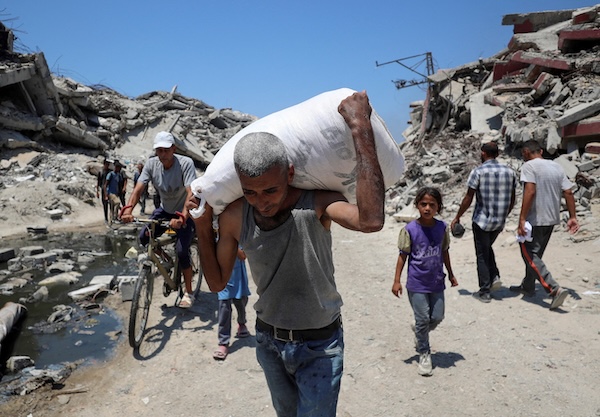 A Palestinian carries a bag with aid supplies that entered Gaza through Israel, in Beit Lahia, northern Gaza Strip, 27 July 2025;
Credit: Reuters/Mahmoud Issa
A Palestinian carries a bag with aid supplies that entered Gaza through Israel, in Beit Lahia, northern Gaza Strip, 27 July 2025;
Credit: Reuters/Mahmoud Issa
JERUSALEM/GAZA (Reuters) - Israel on Sunday 27 July 2025 announced a halt in military operations for ten hours a day in parts of Gaza and new aid corridors as Jordan and the United Arab Emirates air-dropped supplies into the enclave, where images of starving Palestinians have alarmed the world.
Israel has been facing growing international criticism, which the government rejects, over the humanitarian crisis in Gaza, and indirect ceasefire talks in Doha between Israel and the Palestinian militant group Hamas have broken off with no deal in sight.
US President Donald Trump, on a visit to Scotland, said Israel would have to make a decision on its next steps in Gaza, and said he did not know what would happen after the collapse of ceasefire and hostage-release negotiations with Hamas.
Military activity will stop daily from 10 am to 8 pm (09:00-19:00 CEST) until further notice in Al-Mawasi, a designated humanitarian area along the coast, in central Deir al-Balah and in Gaza City, to the north.
The military said designated secure routes for convoys delivering food and medicine will also be in place between 6 am and 11 pm (05:00-22:00 CEST) starting from Sunday.
The United Nations food aid agency needs quick approvals by Israel for its trucks to move into Gaza if it is to take advantage of Israel's planned humanitarian pauses in fighting, a senior World Food Programme official said on Sunday.
United Nations aid chief Tom Fletcher said on Sunday that some movement restrictions appeared to have been eased by Israel in Gaza on Sunday after Israel decided to “support a one-week scale-up of aid.”
Initial reports indicate that more than 100 truckloads of aid were collected from crossings to be transported into Gaza, Fletcher said in a statement.
“This is progress, but vast amounts of aid are needed to stave off famine and a catastrophic health crisis,” he said.
In their first air-drop in months, Jordan and the United Arab Emirates parachuted 25 tonnes of aid into Gaza on Sunday, a Jordanian official said, but added that it was not a substitute for delivery by land.
Palestinian health officials in Gaza City said at least ten people were injured by falling aid boxes.
Work on a UAE project to run a new pipeline that will supply water from a desalination facility in neighbouring Egypt to around 600,000 Gazans along the coast would also begin in a few days, the Israeli military said.
Dozens of Gazans have died of malnutrition in recent weeks, according to the Gaza Health Ministry in the Hamas-run enclave.
The ministry reported six new deaths over the past 24 hours due to malnutrition, bringing the total deaths from malnutrition and hunger since the war began in 2023 to 133, including 87 children.
On Saturday 26 July 2025, a five-month-old baby, Zainab Abu Haleeb, died of malnutrition at Nasser Hospital, health workers said.
"Three months inside the hospital and this is what I get in return, that she is dead," said her mother, Israa Abu Haleeb, as the baby's father held their daughter's body wrapped in a white shroud.
The Egyptian Red Crescent said it was sending more than 100 trucks carrying over 1,200 metric tonnes of food to southern Gaza on Sunday. Some had been looted in the area of Khan Younis after entering Gaza, residents said.
Aid groups said last week there was mass hunger among Gaza's 2.2 million people, and international alarm over the humanitarian situation has increased.
A group of 25 states including the UK, France and Canada last week said Israel's denial of aid was unacceptable.
The military's spokesperson said Israel was committed to international law and monitors the humanitarian situation daily. Brigadier General Effie Defrin said there was no starvation in Gaza, but appeared to acknowledge conditions were critical.
"When we start approaching a problematic line (threshold) then the IDF works to let in humanitarian aid," he said. "That's what happened over the weekend."
Israel cut off aid to Gaza from the start of March to pressure Hamas into giving up dozens of hostages it still holds, and reopened aid with new restrictions in May.
Israel says it has been allowing in aid but must prevent it from being diverted by militants and blames Hamas for the suffering of Gaza's people.
Hope, uncertainty
Many Gazans expressed some relief at Sunday's announcement, but said fighting must end.
"People are happy that large amounts of food aid will come into Gaza," said Tamer Al-Burai, a business owner. "We hope today marks a first step in ending this war that burned everything up."
Health officials at Al-Awda and Al-Aqsa Hospitals in central Gaza said Israeli firing killed at least seventeen people waiting for aid trucks. Israel's military said it fired warning shots at suspects endangering troops and was unaware of any casualties.
Prime Minister Benjamin Netanyahu said Israel would continue to allow the entry of humanitarian supplies whether it is fighting or negotiating a ceasefire and vowed to press on with the campaign until "complete victory".
Hamas said Israel was continuing its military offensive.
"What is happening isn't a humanitarian truce," said Hamas official Ali Baraka.
The war began on 7 October 2023, when Hamas-led fighters stormed southern Israel, killing 1,200 people, mostly civilians, and taking 251 hostages back to Gaza, according to Israeli tallies.
Since then, Israel's offensive has killed nearly 60,000 people in Gaza, mostly civilians, according to Gaza health officials, reduced much of the enclave to ruins and displaced nearly the entire population.








